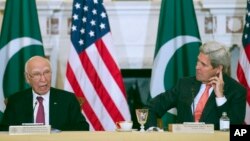Pakistan said Monday at the start of strategic talks with the United States that a contentious sale of F-16 fighter jets would strengthen the South Asian nation's ability to mount counterterrorist operations and promote regional stability.
"The prospective sale of F-16s will strengthen Pakistan capabilities to successfully continue these vital operations for our mutual benefit and stability in the region," said Sartaj Aziz, Pakistani adviser on foreign affairs.
Aziz met with U.S. Secretary of the State John Kerry at the State Department for the sixth Ministerial Level U.S.-Pakistan Strategic Dialogue.
The U.S. government this month approved the sale of the aircraft, radar and electronic warfare equipment to Pakistan in a deal worth nearly $700 million. Neighboring India opposes the sale, which has drawn criticism from some U.S. lawmakers. Congress could block the deal, although such action is rare.
Kerry last week told a House committee that Pakistan's existing fleet of F-16s has been critical for its counterterrorism fight on its western border with Afghanistan. Kerry did not mention the F-16 sale in his remarks Monday, but he commended Pakistan's counterterrorism operations, including in North Waziristan, a tribal area where militants have launched cross-border attacks into Afghanistan.
Watch Kerry's comments on Pakistan
"Cooperation along Pakistan's borders is absolutely essential,” Kerry said after Monday's meeting with Aziz. “We recognize the extraordinary and real sacrifices that Pakistan's military, especially in Operation Zarb-e-Azb and the ongoing missions in North Waziristan, and the United States has pledged $250 million to help rebuild the communities of persons who have been displaced by the fighting in these operations."
Picking and choosing militants
Pakistan has been accused of targeting some militant groups but nurturing or turning a blind eye to others. Kerry welcomed Pakistan's commitment to not differentiate among terrorist groups. He said groups like the Haqqani network and Lashkar-e-Taiba seek to undermine Pakistan's relations with its neighbors.
Kerry also said they would also discuss Pakistan's "obligations of being a responsible state with nuclear weapons."
Adam Ereli, a former U.S. ambassador to Bahrain, said Pakistan is a country of enormous geo-strategic consequences.
"Given the fact that it is a nuclear power [with] an ongoing conflict with India, given its role in Afghanistan, given the fact that it's a Muslim nation of 150 to 160 million, with severe economic and political challenges ... the U.S. has a very, very strong interest in a stable and cooperative relationship with Pakistan," Ereli said.
As the threat of Islamic extremism has grown in Pakistan, so has international concern about the security of the nation's nuclear arsenal.
Experts say Pakistan's nuclear stockpile is growing fast, and it is developing tactical nuclear weapons to deter rival India's larger conventional forces.
Kerry and Aziz also reviewed progress made by six working groups under the framework of the U.S.-Pakistan Strategic Dialogue, including nonproliferation, education, defense consultation group, law enforcement and counterterrorism, economic and finance, as well as the energy working groups, according to spokesman John Kirby.
The U.S. and Pakistan are among members of the so-called "Quadrilateral Coordination Group," which also includes China and Afghanistan, to support a peace process in Afghanistan.
While voicing support for an Afghan-led and an Afghan-all peace talk, Aziz said: "In coming days and weeks, all members of the Quadrilateral process will intensify their efforts toward achieving a broader national consensus in support of peace and reconciliation in Afghanistan."






